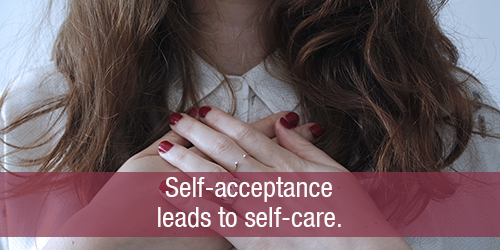Many people we work with have a fear of self-acceptance because they believe they won’t be motivated to change.
When I talk or write about the importance of self-acceptance, instead of feeling inspired, some people feel afraid. For example one person left this comment on one of my blog posts:
“If I accepted myself as I am, why would I change? If I accept myself, I admit defeat.”
 It is a common misunderstanding that self-acceptance will lead to complacency and giving up.
It is a common misunderstanding that self-acceptance will lead to complacency and giving up.
I understand where this fear of self-acceptance is coming from. Many people believe that when they are hard on themselves, they are more likely to change. Instead, it often keeps them stuck in self-blame, guilt, shame, and old behaviors.
While it may seem counterintuitive, self-acceptance is the starting line for change, not the lack of change.
I’ll try to explain it a different way.
Fear of self-acceptance prevents real change
Let’s say you had a child who had some behaviors that needed to be addressed. Maybe they were acting up or being rude and disrespectful.
Imagine now that in response to their behaviors you said to the child, “You are horrible! I can’t stand you! I can not love you the way you are. I will only love you and accept you when you stop … (fill in the behavior).”
Now, think about most children you know. Would they be motivated to change for the long run if they were spoken to that way?
Or are they more likely to feel wounded, unloved, and unworthy?
If you think about it, won’t a child be more likely to become a victim to others who criticize, bully, and abuse them too, because they believe what their trusted parent said to them? Or maybe the child will even become rebellious; after all, you told them they were horrible, so they might as well fulfill that expectation.
What if you approached things a little differently?
If you said to the child, “Oh, I love you so much! I want you to have a wonderful life. When you… (fill in the behavior), it creates problems for you, and I don’t want to see you so unhappy. Let’s work on this together so you can be all that you can be!”
Doesn’t that feel better?
Self-acceptance leads to self-care
Now reread both paragraphs again but fill in the blanks with “binge” or whatever behavior you feel is creating problems for you.
It is a simple fact—lasting change is more likely to happen and persist in a climate of love and understanding.
Take care of yourself because you love and accept yourself, not so you’ll love and accept yourself.
By making this subtle change to your mindset, you can begin to work on any fear of self-acceptance you may have. Once you accept yourself lovingly as you are right now, you are able to make more mindful decisions about your self-care.
This article has been updated from a previous version.
Enjoyed this article? Here are three more that you might find helpful:
Six Steps to Unconditional Self-Acceptance

